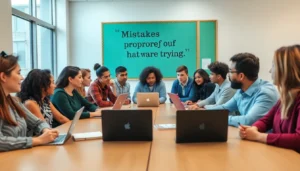Table of Contents
ToggleHave you ever watched a toddler mix flour and water, creating what can only be described as a somewhat delicious disaster? This is the essence of the experimental mindset. For some, it conjures images of scientific breakthroughs or tech innovations, but it’s much more than that. It’s about approaching life with a curious, adaptable attitude. It’s about viewing obstacles as opportunities and embracing the unknown with open arms. So strap in, because we’re diving into the world of experimentation, innovation, and a sprinkle of humor.
Understanding the Experimental Mindset

At its core, the experimental mindset embodies a willingness to explore and take risks. It invites individuals to step outside their comfort zones and explore the uncharted territories of ideas and concepts. This mindset is characterized by a sense of curiosity and a drive to uncover new possibilities.
Think about how scientists tackle unknowns. They pose questions, explore hypotheses, and run tests. This iterative process can be applied to everyday situations, whether it’s trying out a new recipe, testing a different approach at work, or even experimenting with personal relationships. Individuals with an experimental mindset understand that failure is not just an outcome: it’s a necessary stepping stone to learning and growth.
Key Characteristics of an Experimental Mindset
Several traits define an individual with an experimental mindset:
- Curiosity: A deep-seated desire to learn and discover. Curiosity drives questions, and questions lead to exploration.
- Adaptability: Flexibility is essential. An experimental mindset roots itself in the capacity to pivot when things don’t go as planned.
- Resilience: The ability to bounce back from setbacks. Not every experiment yields success, and that’s perfectly okay.
- Openness to Feedback: Feedback is crucial for growth. An experimental mindset thrives on input, using it to refine approaches.
- Creativity: Thinking outside the box is key. Creative problem-solving often leads to unprecedented innovations.
Benefits of Cultivating an Experimental Mindset
Adopting an experimental mindset can offer numerous advantages in personal and professional arenas. Firstly, it fosters innovation. When individuals feel empowered to try new things, they naturally generate fresh ideas that can lead to significant breakthroughs.
How to Develop an Experimental Mindset
To develop such a mindset, individuals can start by embracing small daily experiments. Whether it’s rearranging the workspace for productivity or trying a new approach to communication, these small shifts can encourage growth. It’s also helpful to document experiences, what worked, what didn’t, and why. By reflecting on these experiments, one gains deeper insights into their learning processes.
Also, surrounding oneself with diverse thinkers can enhance creativity and broaden perspectives. The more varied the insights, the richer the experimental experience.
Overcoming Barriers to an Experimental Mindset
Even though its benefits, several barriers can hinder one’s ability to adopt an experimental mindset. Fear of failure often looms large. The thought of stroking out ‘failure’ on one’s personal report card can be paralyzing. But, recognizing that failure is a part of the journey is vital.
Another barrier is the desire for certainty. Many people prefer tried-and-true methods, fearing that experimentation might lead them astray. Cultivating comfort in ambiguity and uncertainty can help break this cycle. Establishing a supportive environment, whether at home or in professional settings, is crucial. When individuals feel safe to express their ideas without judgment, they’re more likely to step outside their comfort zones.
Real-World Applications of an Experimental Mindset
The experimental mindset finds application across various fields. In the tech industry, for instance, agile methodologies emphasize iterative development and regular feedback. Organizations like Google encourage employees to ‘fail fast’ and learn from their mistakes, which has led to numerous innovations.
In education, teachers employing an experimental mindset often integrate project-based learning, allowing students to explore subjects hands-on. This not only fosters critical problem-solving skills but also engages students in a more meaningful way.
Even in personal life, embracing an experimental mindset can lead to better relationships and self-discovery. By trying new social activities, meeting diverse individuals, or exploring different hobbies, one can uncover passions and interests that might have otherwise remained hidden.




